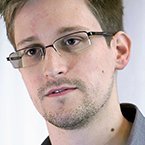
Jrgen Flchle - Fotolia
Snowden: the IT analyst turned whistleblower who exposed mass surveillance
Oliver Stone's biopic on Edward Snowden reaches the heart of the ethical crisis posed by mass surveillance for the state and ordinary citizens
In Snowden, film director Oliver Stone has taken the tricky subject of digital surveillance and humanised it, embedding the key issues of intrusion of citizens’ privacy and a Big Brother state in an easily accessible drama.
As the title implies, this is not a film explicitly about the processes that underlie the US National Security Agency’s (NSA) mass surveillance programmes, but is instead set firmly in the biopic tradition, describing the journey of the man who blew the whistle.
Stone named his much-lauded films about US presidents John F. Kennedy and Richard Nixon after the men themselves. By doing the same with Edward Snowden’s story, he has named a new American icon. Nixon’s record is tarnished, yet his presidency threw the US into one of the greatest constitutional crises of the 20th century. Snowden has laid bare another for the 21st.
The actor Rhys Ifans, who plays an intelligence officer, said at the UK premiere on 15 October 2016 that he believed this to be one of the most important stories to be told in the past 100 years. His co-star, Joely Richardson, who plays the Guardian’s US editor, Janine Gibson, described the story as “magnificent and terrifying – it relates to all of us”.
Ifans, cast as a CIA man apparently in two minds as to whether to recruit Snowden or not, is party to what must be one of the most overloaded instances of dramatic irony in cinematic history. “Thank you, sir – you won’t regret this,” replies an eager young Snowden, when he gets the job.
Essentially, this is the tale of an idealistic patriot motivated solely by the common good. He enlists to serve his country and, when the gruelling army regime leads to broken legs and an administrative discharge, he joins the CIA. An unethical field mission in Geneva leads him to resign, only to join the NSA as an infrastructure analyst.
Snowden’s revelations in the news
Based on journalist Luke Harding’s book, The Snowden Files, the story is told more or less chronologically from 2004 to 2013, with flashbacks from the Hong Kong hotel room where he famously met American documentary maker Laura Poitras, the Guardian’s American correponsdent Glenn Greenwald, and Ewen MacAskill from the Guardian in London.
In this film, the big names – Ifans, Richardson, Nicholas Cage – have supporting roles to Joseph Gordon-Levitt and Shailene Woodley, who play Snowden and his girlfriend, Lindsay Mills. This seems appropriate; whereas the stars take establishment roles, the lesser-known actors are Every(wo)man, albeit particularly noble versions.
 Edward Snowden (image:
Edward Snowden (image:
Laura Poitras, Praxis Films)
There is much less focus on the journalists involved than in Poitras’s documentary, Citizenfour. Here, they ratchet up the tension in the race to make Snowden’s revelations world news – they are almost a counterpart to the establishment machine. As MacAskill points out, Snowden needs them to expose the wrongdoing, partly to prevent him from being rendered by the CIA outside the law.
A secretive intrusion of privacy
The human emphasis plays up the ethical issues with much more show than tell, something that is hard for documentaries to do well. One of the uglier moments, while Snowden is still in the CIA, involves an NSA operative showing him how easy it is to activate the webcam on a subject’s laptop, with technology that “came from the Brits”.
After the two men watch a Muslim subject’s sister-in-law undress from her niqab to her underwear in a hotel room, Snowden takes to putting sticky plasters over the webcam on his laptop and that of his girlfriend. This alone should make the argument, once and for all, that privacy has nothing to do with “having something to hide” and that we allow intrusions on that privacy at our peril.
The earlier NSA whistleblower Bill Binney was name-checked as a primary source by Oliver Stone both in his address to the audience and during the film itself. Stone described Friedrich Moser’s film about Binney, A Good American, as, effectively, a prequel to Snowden. This makes good sense. Binney and Snowden were both driven by patriotism and a desire for transparent, constitutional governance.
Binney’s spectral voice is often very loud in moments where aspects of NSA protocol are discussed. Nicholas Cage plays a CIA cryptographer and lecturer who became deeply disillusioned after designing some tracking software that was eventually applied without either filters or the correct automation. This sounds an awful lot like Binney, although, as he left the NSA in 2001 and Snowden joined several years later, the two would not have met at work.
A question of ethics
As in Moser’s film, the graphics in Snowden are fantastic, and do a great job of making the scope of the NSA’s software easily graspable. Showing how relational profiling through linking metadata is more powerful than simply amassing the content of communications is not always easy. In contrast, clicking names on a flow chart and expanding out to open up a live feed on any chosen subject via their own webcam is obvious and disturbing.
One of the judges in the Investigatory Powers Tribunal observed this summer that the term surveillance only applies to the physical tracking of a subject; digital monitoring of communications is interception. However, when it is possible to view ordinary people in their own homes, using digital technology, the distinction seems irrelevant.
If the film has a significant flaw, it is that it is very one-sided. While this reviewer aligns herself squarely with that side, many people do not, and still see Snowden, not as a hero, but as the man who gave America’s security secrets to her enemies. Stone has Snowden walking out of the NSA building in Hawaii, to be framed in an almost messianic fashion – before his silhouette morphs into that of an alien from The X Files credit sequence.
If you are remotely interested in the ethics of surveillance, this film will be interesting, and it will make a great primer for those who are still trying to work out what all the fuss is about.







